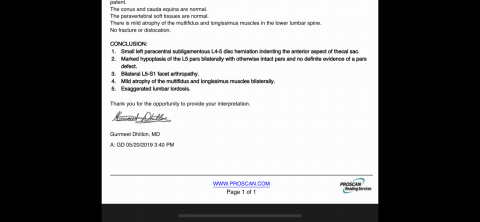Hi,
Thanks Esther for this amazing research! This would be so fun to research.
I had a quick question about my spine. So my spine is a little messed up because once you reach L5 it's deep in my back and there's basically a hole there. This makes the anteverted pelvis much harder for me and I have a few spin segments that stick out along my back. I've tried all the spine lengthening techniques to bring it out but it won't. I also had an MRI done on my low back for other reasons and here is the conclusion.
I also have forward head posture and a few other things (I did get Nuss procedure done so I do have bars in my chest). The forward head will go away once I figure out how to stretch my mid spine because that's where I feel tension when I try and bring it back. I feel because it's L5 it affects everything more since it's the bottom of my spine.
I guess I'm wondering if there's any way around the defenct in my L5? I realize everything is connected so I'm not worried about the lordosis or anything like that. I can see how this method works as I can do fragments of it and how it all works together.




4 years 3 months ago
05/02/2020 - 2:07pm
After browsing through other topics, I found someone asking about the pelvic floor while squatting. I found that I used my pelvic floor as if it was my core for stability. I had it constantly flexed and when I relaxed it I am able to do the posture steps properly and without tension. This hasn't fixed everything, but I think I can improve much quicker with this realization.
4 years 3 months ago
05/02/2020 - 2:07pm
Here is the MRI picture
23 hours 12 min ago
10/18/2017 - 10:36am
Hello, Zalbert.
It sounds like you've already made some realizations.
Getting the pelvis positioned correctly is the basis for good posture, and it does affect everything else, including the head. As your pelvic position improves, the head will be easier to adjust as well.
The pelvic floor isn't supposed to do the core's job. Using the right muscles allows everything else to relax, and find it's proper position easier.
Focus on your rib anchor. This is a major way in lengthening the spine in nearly every possible position.
Can I assume you've taken a Foundation's Course with a teacher? Have you read 8 Steps to a Pain-Free Back?
I will ask on the teacher's forum and see if anyone has had experience with the conditions you mentioned. The image you provided will help in figuring out what is going on.
Best of luck on your posture journey.
4 years 3 months ago
05/02/2020 - 2:07pm
Hi Eric,
thanks for the response!
I haven't taken the foundational course but I do have the book and it's worked wonders. When I do the rib tuck my head goes really far forward and when I lengthen they back of my neck It doesn't go back like a vertebrae or something stops it. Also when I tuck my ribs my pelvis is trying to get into the correct position, but it feels tense near the sacrum and just above it on both sides.
I wanted to take the course but nothing has been available given the current state of the world.
23 hours 12 min ago
10/18/2017 - 10:36am
It sounds to me like you might be tucking the pelvis when doing the rib anchor. This is a common thing beginners do. Tucking the pelvis means parking it forward and/or curling it in, which rounds the entire spine, brings the head and neck forward, makes it difficult or impossible to straighten anything without tension, and is what we all should avoid.
Rib anchoring shouldn't pull the pelvis forward, only the ribcage should move down and in. It can be a little tricky, as we are using a set of muscles most of us don't use very often, at least conciously.
While most in-person events are temporarily halted, there are online workshops and courses happening. While you wait for an in-person foundations course to become available, check out these resources. Some are even free. This will give you a chance to see the techniques in action.
Of course, taking a class with a hands on teacher is the best and most effective way of learning.
Best of luck.